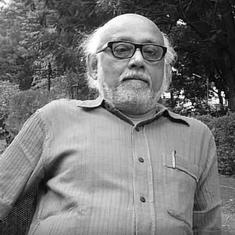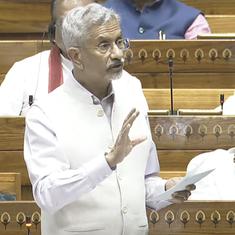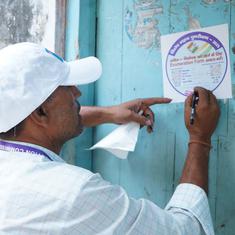Coronavirus pandemic created inequality, made access to justice dependent on technology, says CJI
Courts in India have been holding virtual hearings since March due to the pandemic.

Chief Justice of India Sharad Arvind Bobde on Thursday said that the coronavirus crisis created a new kind of inequality, making access to justice dependent on access to technology, Bar and Bench reported. Courts in India have been holding virtual hearings due to the pandemic.
Bobde, while speaking at an event organised by the Supreme Court to mark Constitution Day, said that courts “simply didn’t exist” for a large section people who had no access to technology. “The virus spurred an inequality,” the chief justice said. “It made access to justice dependent on access to technology. Those who did not have access to technology did not have access to justice.”
The chief justice added: “It was very unfortunate to have visited districts in India to be told that for a large section which do not have access to technology, courts simply don’t exist.”
Bobde said that due to the coronavirus crisis, the courts had to either switch to virtual hearings or shut down completely, The Indian Express reported. He added that the courts had to hear cases related to migrant workers, handling of the bodies of coronavirus patients, treatment costs and shortcomings in the handling of the health crisis.
Also read: Covid impact: Cases disposed of by High Courts drop by half, district courts by 70%
Bobde appealed to Information Technology and Communications Minister Ravi Shankar Prasad to help eliminate the technology-related inequality. He said that the Supreme Court had set up kiosks and mobiles with internet connection for lawyers and litigants in several districts, but added that more efforts had to be made, according to Bar and Bench.
Prasad, who was also a part of the event, praised the courts for their work amid the crisis. “I have to commend the judiciary during these times,” he said. “The Supreme Court has heard and disposed of or is in the process of hearing close to 30,000 cases digitally. High Courts have heard 13.76 lakh cases digitally. Districts courts have heard 35.93 lakh cases digitally.”
The Supreme Court and high courts have been pulling up the state governments over their faults in handling the coronavirus crisis. Earlier this week, the Supreme Court had ordered Delhi, Maharashtra, Gujarat and Assam to submit their coronavirus status reports within two days. Several states in the country are witnessing a surge in infections.
In June, the Supreme Court had intervened in the migrant workers’ crisis and directed the Centre and state governments to send them back to their hometowns within a period of 15 days. The sudden lockdown announced by Prime Minister Narendra Modi on March 25 had triggered an exodus of migrant workers, who were left without jobs in big cities.









